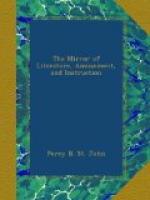servant’s capacity in the art of borrowing,
or, at all events, on his ingenuity on framing an excuse,
inquired, with an angry voice, why there was no table-cloth.
The answer was, “Massa not got;” with
which reply, after apologizing to his guests, he was
compelled, for the present, to put up. The next
morning he called his servant, and rated him soundly,
and perhaps beat him, (for I lament to say that this
was too much the practice with European masters in
India,) for exposing his poverty to the company; desiring
him, another time, if similarly circumstanced, to
say that all the table-cloths were gone to the wash.
Another day, although the table appeared clothed in
the proper manner, the spoons, which had probably found
their way to the bazar, perhaps to provide the very
articles of which the feast was composed, were absent,
whether with or without leave is immaterial.
“Where are all the spoons?” cried the apparently
enraged master. “Gone washerman, sar!”
was the answer. Roars of laughter succeeded, and
a teacup did duty for the soup-ladle. The probable
consequence of this unlucky exposure of the domestic
economy of the host, namely, a sound drubbing to the
poor maty-boy, brings to my mind an anecdote which,
being in a story-telling vein, I cannot resist the
temptation of introducing. It was related to
me, with great humour, by one of the principals in
the transaction, whose candour exceeded his fear of
shame. He had been in the habit of beating his
servants, till one in particular complained that he
would have him before Sir Henry Gwillam, then chief
justice at Madras, who had done all in his power to
suppress the disgraceful practice. Having a considerable
balance to settle with his maty-boy on the score of
punishment, but fearing the presence of witnesses,
the master called him one day into a bungalow at the
bottom of his garden, at some distance from the house.
“Now,” said he as he shut the door and
put the key into his pocket, “you’ll complain
to Sir Henry Gwillam, will you? There is nobody
near to bear witness to what you may say, and, with
the blessing of God, I’ll give it you well.”—“Massa
sure nobody near?” asked the Indian.—“Yes,
yes, I’ve taken good care of that.”—“Then
I give massa one good beating.” And forthwith
the maty-boy proceeded to put his threat into execution,
till the master, being the weaker of the two, was
compelled to cry mercy; which being at length granted,
and the door opened with at least as much alacrity
as it was closed, Maotoo decamped without beat of drum,
never to appear again.—Twelve Years’
Military Adventures, &c.
* * * * *
THE GATHERER.
A snapper up of unconsidered trifles.
SHAKSPEARE.
* * * * *
MEMENTO MORI.
Inscribed on a Tombstone.
When you look on my grave,
And behold how they wave,
The cypress, the yew, and the willow,
You think ’tis the breeze
That gives motion to these—
’Tis the laughter that’s shaking my
pillow.




